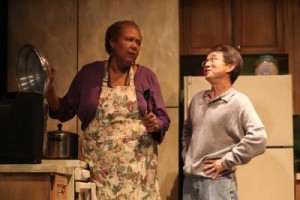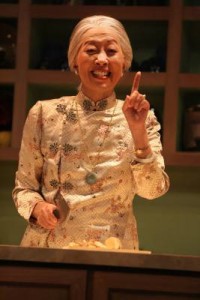RECOMMENDED
East meets West in Kenneth Lin’s Po Boy Tango, a culture-clash dramedy now getting its West Coast premiere at Little Tokyo’s East West Players.
Representing the East is Richie Po, a 50ish Taiwanese immigrant and longtime Long Island resident. The West is represented by 40something African American nurse Gloria B, who ten years previously had cared for Richie’s young daughter Emma during her bout with cancer. Inexplicably for Gloria, Emma’s recovery marked the end of her friendship with the Po family, and she and Richie have not seen each other for ten years. The reason for their decade-long estrangement is not made clear until Po Boy’s gripping, satisfying second act—in a denouement well worth waiting for.
There’s only one hitch. About a third through Act One, Po Boy Tango pretty much comes to a halt, enough so that several members of its Opening Night audience did not return to their seats post-intermission. If ever, though, there was a play which proves that patience is a virtue, Po Boy Tango is just that play, and those who stick it out will be rewarded with an eminently satisfying Act Two, one that packs a real emotional wallop.
Po Boy Tango starts out almost as strong as it finishes, introducing us to Richie (Dennis Dun) and Gloria (Esther Scott) when the latter shows up late at night in Richie’s kitchen and finds her former employer fast asleep in front of the TV. Soon enough, Gloria learns why Richie has summoned her to his Merrick, New York home. Richie’s wife Meilan and the now adult Emma have flown to Taiwan for the funeral of Richie’s mother, celebrity TV chef Po Mama (Jeanne Sakata). Afraid-of-flying Richie has stayed at home, and wants to take advantage of wife and daughter’s absence to prepare a surprise for Emma’s upcoming wedding. He explains to Gloria that the best possible gift he could give his daughter would be to recreate his mother’s “Great Banquet” for her wedding reception, and the only person he trusts to accomplish this task is soul food chef extraordinaire Gloria B. When Gloria protests that she’s not qualified to cook Chinese style nor is she able to read the notes Po Mama has left behind, Richie reassures her that he will translate and “fill in the missing parts from my memory. From the taste in my mouth.” Also, Po Mama has left behind a series of videos and, Richie tells her, “She speaking Chinese but you can watch for technique.”
If this were real life, Gloria B. might say, “Sorry, no can do,” return to her home in neighboring Roosevelt, and that would be that—and there would be no play. Because this is theater, though, Gloria lets herself be persuaded to stay and help with the feast, not solely for Emma’s sake, but because Richie has promised to open a soul food restaurant with Gloria as head chef—and full 50-50 partner in the endeavor. All she has to do is make sure that Emma gets her wedding day banquet.
During the first twenty minutes of Po Boy Tango, we also learn that Gloria’s son Kelvin is a rising star on his college basketball team (though not what caused the rupture in her friendship with the Po family). Then things bog down, way down. There’s a lengthy “clip” from Po Mama’s video diary, and though it is played live by the wonderful Sakata, it runs about twice as long as it should. Richie and Gloria then go shopping. They talk about soup. Po Mama reminisces about her past. Gloria protests when Richie makes her cook a still-live fish but does her best. Richie and Gloria talk some more. They dance the tango. Gloria agrees to stay and help with the banquet. Lights out on Act One.
I wondered at intermission whether my lack of interest in the preceding forty minutes might be due in any way to the performances or the direction, however when I later read the first act of the script, available online, I realized that the very same thing happened as I was reading. At pretty much the same point, I lost interest and began skimming ahead.
Fortunately last night, I stuck around for Act Two.
From the act’s opening moments, Dun, Sakata, and Scott had me hooked. As Esther might have put it, we were at last getting down to the real nitty-gritty: What on earth could possibly have possessed Richie and his family to turn their backs on the woman who had cared for their daughter with such love and devotion? The answers are not simple ones, and have a great deal to do with the way people from diametrically opposed cultures feel about and deal with illness and death. Thus, the second act makes for drama that both grips and elucidates, and as Richie and Esther begin to lay bare their hearts, they touch the audience’s hearts at the same time.
The Chance Theater’s Artistic Director Oanh Nguyen makes an impressive East West Players directorial debut here, his own experiences as a first generation Vietnamese immigrant giving him insight a second or third generation director might not have had. One of Nguyen’s directorial touches was to make Po Mama an ever-present spirit in Richie’s life, and in fact, she hovers over her son and Gloria throughout the second act, even as Richie and Gloria travel from their kitchens to a pond in Syracuse for the play’s cathartic finale.
All three actors are wonderful. As Richie, Dun shows us a man with a heart of gold whose decisions don’t always have the effect on others that he was planning, someone whose cultural values can place him at odds with a tell-it-like-it-is woman like Gloria B. (The part is also extremely well-written, with precisely the grammatical mistakes that someone who arrived in the States as an adult might still be making even years later.) Going on as Gloria with just a week of rehearsal, Scott does wonderful, heartfelt work here in a performance that will only become richer throughout the run. Recreating the role she originated in the World Premiere production earlier this year in Chicago, Sakata is never anything less than marvelous, disappearing into the skin of an elderly but still vibrant Taiwanese woman. (All right, she’s a ghost, but she’s still vibrant.)
Shaun L. Motley has designed a fine kitchen set, which John MacDonald’s projections transform in the final scene into the Syracuse pond. (I was confused, however, when midway through Act Two, the same kitchen was suddenly supposed to be Gloria B’s.) KC Wilkerson has created an effective lighting design, and the same can be said for Erika Miller’s costumes and Christopher Scott Murillo’s work as property master. (Unlike the Chicago production, the food prepared and consumed by Richie and Gloria is real, not mimed.) Best of all is Nathan Wang’s sound design and original music, both off which greatly enhance the play’s effectiveness.
Ultimately, I couldn’t help feeling that Po Boy Tango would make for a sensational ninety-minute one-act play, as painful it might be for the playwright to discard a big chunk of the first act. As is, I urge theatergoers not to give up on Richie and Gloria but to stick around for the emotional power that ignites when the lights go back up after intermission. These two flawed but deeply human individuals are well worth your patience.
East West Players, David Henry Hwang Theatre, 120 Judge John Aiso St., Los Angeles.
www.eastwestplayers.org
–Steven Stanley
November 11, 2009
Photos: Michael Lamont




 Since 2007, Steven Stanley's StageSceneLA.com has spotlighted the best in Southern California theater via reviews, interviews, and its annual StageSceneLA Scenies.
Since 2007, Steven Stanley's StageSceneLA.com has spotlighted the best in Southern California theater via reviews, interviews, and its annual StageSceneLA Scenies.







 COPYRIGHT 2024 STEVEN STANLEY :: DESIGN BY
COPYRIGHT 2024 STEVEN STANLEY :: DESIGN BY